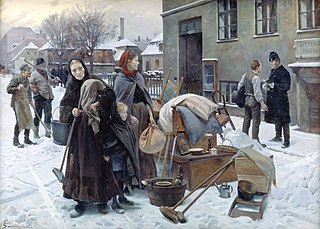Lejeloven, formally Lov om leje, is a Danish law which governs rentals of residential tenancies in private rented accommodation, including single-family homes, condominiums, so-called mixed properties and club premises. The law therefore does not apply to public housing or to commercial leases.

Denmark, officially the Kingdom of Denmark, is a Nordic country and the southernmost of the Scandinavian nations. Denmark lies southwest of Sweden and south of Norway, and is bordered to the south by Germany. The Kingdom of Denmark also comprises two autonomous constituent countries in the North Atlantic Ocean: the Faroe Islands and Greenland. Denmark proper consists of a peninsula, Jutland, and an archipelago of 443 named islands, with the largest being Zealand, Funen and the North Jutlandic Island. The islands are characterised by flat, arable land and sandy coasts, low elevation and a temperate climate. Denmark has a total area of 42,924 km2 (16,573 sq mi), land area of 42,394 km2 (16,368 sq mi), and the total area including Greenland and the Faroe Islands is 2,210,579 km2 (853,509 sq mi), and a population of 5.8 million.

Law is a system of rules that are created and enforced through social or governmental institutions to regulate behavior. It has been defined both as "the Science of Justice" and "the Art of Justice". Law is a system that regulates and ensures that individuals or a community adhere to the will of the state. State-enforced laws can be made by a collective legislature or by a single legislator, resulting in statutes, by the executive through decrees and regulations, or established by judges through precedent, normally in common law jurisdictions. Private individuals can create legally binding contracts, including arbitration agreements that may elect to accept alternative arbitration to the normal court process. The formation of laws themselves may be influenced by a constitution, written or tacit, and the rights encoded therein. The law shapes politics, economics, history and society in various ways and serves as a mediator of relations between people.
A leasehold estate is an ownership of a temporary right to hold land or property in which a lessee or a tenant holds rights of real property by some form of title from a lessor or landlord. Although a tenant does hold rights to real property, a leasehold estate is typically considered personal property.
The law is intended to protect the tenant, by, among other provisions, limiting how much a landlord may ask in rent; in addition, the rent must be proportionate to the value of the premises. The law also states that a maximum of three months' rent may be required as a deposit, and that there is to be a separate accounting for heating, and finally the law sets out the rules which apply with respect to maintenance and expenditures incurred in connection with improvements.

A landlord is the owner of a house, apartment, condominium, land or real estate which is rented or leased to an individual or business, who is called a tenant. When a juristic person is in this position, the term landlord is used. Other terms include lessor and owner. The term landlady may be used for female owners, and lessor may be used regardless of gender. The manager of a UK pub, strictly speaking a licensed victualler, is referred to as the landlord/lady.
The Act is subject to periodic review and was last revised on 1 July 2015.
Public rental housing is governed by the so-called M ordningen, for miksordningen or mellemtingsordningen (mixed or temporary system).
This page is based on this
Wikipedia article Text is available under the
CC BY-SA 4.0 license; additional terms may apply.
Images, videos and audio are available under their respective licenses.

Public housing is a form of housing tenure in which the property is owned by a government authority, which may be central or local.

Renting, also known as hiring or letting, is an agreement where a payment is made for the temporary use of a good, service or property owned by another. A gross lease is when the tenant pays a flat rental amount and the landlord pays for all property charges regularly incurred by the ownership. An example of renting is equipment rental. Renting can be an example of the sharing economy.

Eviction is the removal of a tenant from rental property by the landlord. In some jurisdictions it may also involve the removal of persons from premises that were foreclosed by a mortgagee.
Section 8 of the Housing Act of 1937, often called Section 8, as repeatedly amended, authorizes the payment of rental housing assistance to private landlords on behalf of approximately 4.8 million low-income households, as of 2008, in the United States. The largest part of the section is the Housing Choice Voucher program which pays a large portion of the rents and utilities of about 2.1 million households. The U.S. Department of Housing and Urban Development manages Section 8 programs.
A waiver is the voluntary relinquishment or surrender of some known right or privilege.
A rental agreement is a contract, usually written, between the owner of a property and a renter who desires to have temporary possession of the property as distinguished from a lease which is more typically for a fixed term. As a minimum, the agreement identifies the parties, the property, the term of the rental, and the amount of rent for the term. The owner of the property may be referred to as the lessor and the renter as the lessee.
Housing Benefit is a means tested social security benefit in the United Kingdom that is intended to help meet housing costs for rented accommodation. It is the second biggest item in the Department for Work and Pensions' budget after the state pension, totalling £23.8 billion in 2013–14.
Local Housing Allowance (LHA) was introduced on 7 April 2008 to provide Housing Benefit entitlement for tenants renting private sector accommodation in England, Scotland and Wales. The LHA system introduced significant changes to the way Housing Benefit (HB) levels are restricted and how benefit is paid. It did not replace Housing Benefit - it is just a different way of calculating entitlement under the existing Housing Benefit scheme: the Local Housing Allowance is based on the 30th percentile of local rented accommodation. LHA rates relate to the area in which the housing benefit claim is made. These areas are called Broad Rental Market Areas, defined as "where a person could reasonably be expected to live taking into account access to facilities and services."
Rent control in Ontario refers to a system of rent regulation in Ontario, Canada which limits the amount by which the rent paid by tenants for rental accommodation can increase.
Landlord harassment is the willing creation, by a landlord or his agents, of conditions that are uncomfortable for one or more tenants in order to induce willing abandonment of a rental contract. Such a strategy is often sought because it avoids costly legal expenses and potential problems with eviction. This kind of activity is common in regions where rent control laws exist, but which do not allow the direct extension of rent-controlled prices from one tenancy to the subsequent tenancy, thus allowing landlords to set higher prices. Landlord harassment carries specific legal penalties in some jurisdictions, but enforcement can be very difficult or even impossible in many circumstances. However, when a crime is committed in the process and motives similar to those described above are subsequently proven in court, then those motives may be considered an aggravating factor in many jurisdictions, thus subjecting the offender(s) to a stiffer sentence.
Rent control in New York is a means of limiting the amount of rent charged on dwellings. Rent control and rent stabilization are two programs used in parts of New York state. In addition to controlling rent, the system also prescribes rights and obligations for tenants and landlords.
The Ellis Act is a 1985 California state law that allows landlords to evict residential tenants to "go out of the rental business" in spite of desires by local governments to compel them to continue providing housing.
The Landlord and Tenant Board is an adjudicative tribunal operated by the government of Ontario that provides dispute resolution of landlord and tenant matters under the Residential Tenancies Act, 2006.
Rent regulation in Canada is a set of laws and policies which control the amount by which rental prices for real property can increase year to year. Each province can pass legislation, where the purpose is to limit rent prices increasing beyond what is affordable for most home dwellers.

Rent regulation is a system of laws, administered by a court or a public authority, which aim to ensure the affordability of housing and tenancies on the rental market for dwellings. Generally, a system of rent regulation involves:
The Costa–Hawkins Rental Housing Act ("Costa–Hawkins") is a California state law, enacted in 1995, which places limits on municipal rent control ordinances. Costa–Hawkins preempts the field in two major ways. First, it prohibits cities from establishing rent control over certain kinds of residential units, e.g., single family dwellings and condominiums, and newly constructed apartment units; these are deemed exempt. Second, it prohibits "vacancy control", also called "strict" rent control.
The Rental Assistance Demonstration is a federal housing program that was enacted as part of the Consolidated and Further Continuing Appropriations Act, 2012, and is administered by the U.S. Department of Housing & Urban Development (HUD). Broadly, the purpose of the Rental Assistance Demonstration is to provide a set of tools to address the unmet capital needs of deeply affordable, federally assisted rental housing properties in order to maintain both the viability of the properties and their long-term affordability. It also simplifies the administrative oversight of the properties by the federal government. Specifically, RAD authorizes the conversion of a property's federal funding from one form to another, where the initial form presents structural impediments to private capital investment and the new form is not only familiar to lenders and investors but, since its enactment in 1974, has leveraged billions in private investment for the development and rehabilitation of deeply affordable rental housing.






